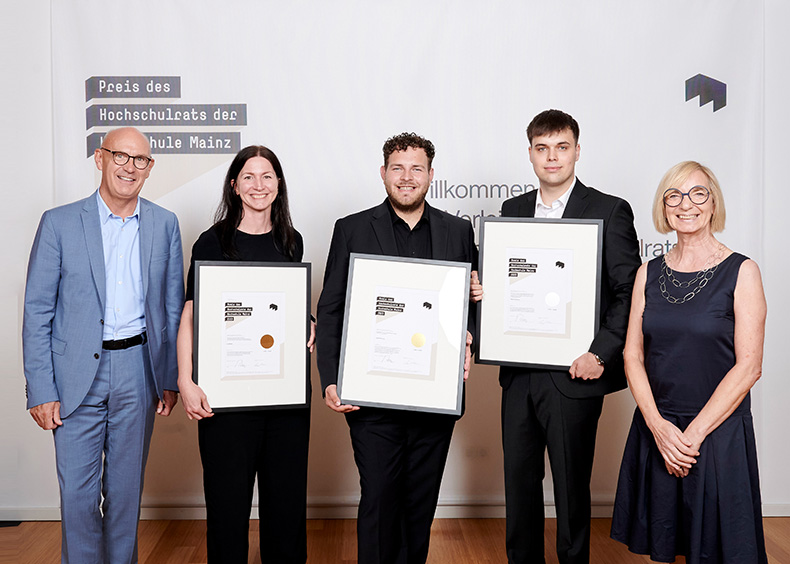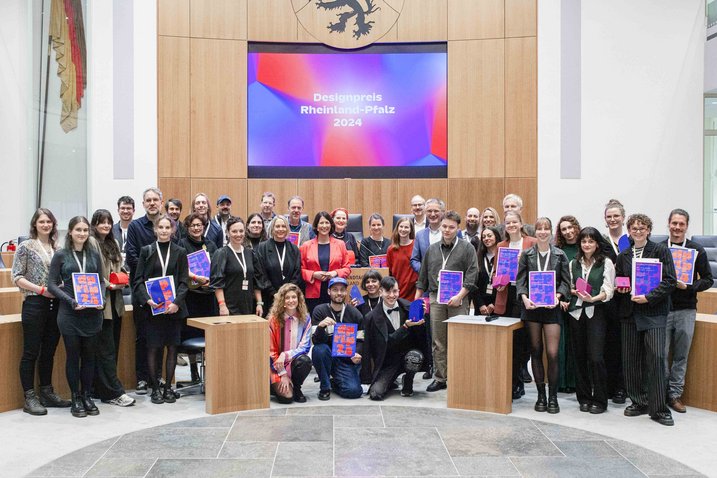During a ceremony at the Mainz Volksbank on July 6, 2023, Uwe Abel, Chairperson of the Board of Mainzer Volksbank and Chairperson of the University Council of Mainz University of Applied Sciences, and Prof. Dr. Susanne Weissman, President of Mainz University of Applied Sciences, awarded this year’s University Council Award for Outstanding Academic Achievements. Prof. Dr. Susanne Weissman emphasized at the award ceremony: “With this award, the members of the University Council are once again recognizing very good academic achievements. All the nominated projects stand out above all because they take a position on current socio-political issues. As a university, we are particularly proud of this: students who work with an alert and critical eye on a future worth living for everyone.” This year, three graduates of Mainz University of Applied Sciences were honored with the award, which is sponsored by Mainzer Volksbank and endowed with a total of 10,000 Euros.

Nino Haase, Mayor of the City of Mainz, gave a welcome address at the award ceremony. (Copyright: Nathalie Zimmermann)
- First place, endowed with 5000 Euros, was awarded to Torben Hammerle, a graduate of the Architecture degree program, for his master's thesis Zukunft im LandLeben (The Future in Rural Life). The thesis, supervised by Prof. Dipl.-Ing. Michael Spies and Prof. Dipl.-Ing. Susanne Reiß (both from the School of Engineering, Department of Architecture), was awarded a grade of 1.0.
- The second place award of 3000 Euros went to Fabian Naethbohm, graduate of the degree program Building and Property Management, for his master’s thesis Anwendung KI-unterstützter Bilderkennung für den Abgleich mit dem vertraglich geschuldeten Bausoll im Mängelmanagement (Application of AI-supported image recognition for comparison with the contractually owed construction targets in the management of defects) (supervised by Prof. Dr.-Ing. Axel Freiboth, School of Engineering, Department of Civil Engineering, and Dr. Andreas Düdder, Planning and Construction Management, Johannes Gutenberg University Mainz (JGU).
- Third place, which comes with 2000 Euros, was awarded to Ina Weimer, graduate of the degree program Business Law – Employment Law and Human Resources Management LL.M., for her master’s thesis Die Reichweite des Initiativrechts des Betriebsrats bei der Einführung einer elektronischen Arbeitszeiterfassung (The scope of the works council’s right of initiative in the introduction of electronic tracking of worktime), which received a grade of 1.0. (Supervised by Dr. Daniel Wall, Attorney/Employment Law Specialist and lecturer, and Prof. Dr. Katharina Dahm, Professor of Labor Law, School of Business, Business Law).
Housing development in rural areas
In his award-winning master’s thesis, Torben Hammerle focuses on people's fundamental need for living space and on housing development in rural areas. In doing so, he follows the current debate about migration from urban regions to the surrounding areas – a development that gained momentum during the recent pandemic and now requires new concepts. Addressing this development, the paper proposes sensible strategies to stabilize the emptying town centers after a detailed study of the typical regional settlement and house typologies, to strengthen rural areas, especially in the vicinity of urban regions, and to create equivalent living conditions there.
In his words of appreciation for the thesis, Prof. Michael Spies emphasized: “The University Council is honoring an impressive thesis. With the question of living space in a rural context, Torben Hammerle engages in a highly socio-political process that focuses on communication with the residents living there. However, the socially committed award winner does not deal with this topic theoretically, instead he relates it to his own home – the municipality of Sponheim, with which he is closely connected to this day. He designed his master's thesis in the form of a newspaper, combining technical planning expertise on a scientific level with a format suitable for communication with all local stakeholders. With this initially unusual newspaper format, he succeeds in communicating the planning and development goals in a way that is generally understandable and the transfer of content appropriate and suitable for the target audience.”
Internal development over external development using the municipality of Sponheim in Rhineland-Palatinate as a case study
With the prioritization of internal development to avoid the use of a large amount of land for new residential developments, Torben Hammerle develops sustainable concepts for housing with the social and technical infrastructure in rural areas by including and (re)using the existing structures. As a case study, he chooses his home community Sponheim in the district of Bad Kreuznach in Rhineland-Palatinate, with a feasibility study demonstrating the implementation of planning goals for a regionally specific, locally appropriate, and sustainable development. The work obtains a special quality in the transfer of knowledge from the interviews with representatives of the district administration on the topic of the state's support programs for rural community renewal and with the state consulting office Neues Wohnen Rheinland-Pfalz (New Living Rhineland-Palatinate) on the topics of sustainable forms of living and aspects of the living environment and the neighborhood. Using this expertise, he succeeds in expanding and interlinking the scientific aspects of his master’s thesis in a practical approach. Finally, the thesis makes detailed planning suggestions for the creation of places for congregation, commemoration, and recreation, such as a redesigned town square with multifunctional space or the architectural conversion and further construction of two existing buildings on Roseneck and Rathausstraße for multigenerational living.
Second and third place winners
Fabian Naethbohm (2nd place) focused on the application of AI-supported image recognition for the comparison with the contractually owed construction target in defect management in his master’s thesis, which was awarded a grade of 1.0 – “a highly topical subject with very great practical relevance,” as his supervising professor, Dr.-Ing. Axel Freiboth, emphasizes. The construction and real estate industry is at the dawn of an ever-increasing use of digital tools and methods. Focusing on the use of artificial intelligence (AI) in construction and the advances in automated image recognition and identification with regard to defects, as well as the representation of the comprehensively defined, contractual construction target in BIM models (Building Information Modeling), Fabian Naethbohm developed a new concept in his thesis. The goal was to develop requirements for a BIM model that could be used to depict a standardized, comprehensive, digital construction target. The Real Estate Department of Johannes Gutenberg University Mainz (JGU) and the construction company Karl Gemünden GmbH & Co. KG were his practical partners for his master’s thesis. Fabian Naethbohm is currently pursuing a part-time doctorate on the use of digital models in collaboration with the Technical University of Braunschweig.
The thesis by master’s graduate Ina Weimer (third place), which was also awarded a grade of 1.0, examines the existence of a right of co-determination for the works council in the introduction of electronic time tracking at the workplace. Whether the works council is even able to initiate electronic time tracking against the employer’s will is highly controversial in case law and the literature. After a historical categorization of the main aspects of works council co-determination and the development of the system of the works council's participatory rights, the author rounds off her study with specific recommendations for action on the introduction of electronic time recording using IT tools.

Cover picture of the master's thesis "Zukunft im LandLeben" by by Torben Hammerle. (Copyright: Torben Hammerle)




